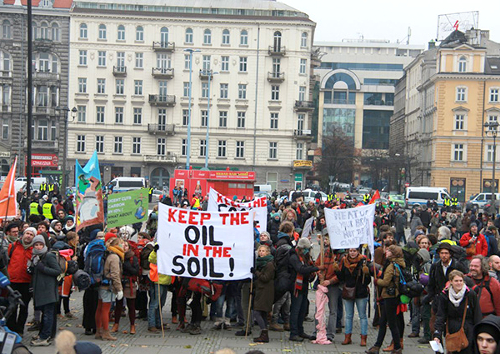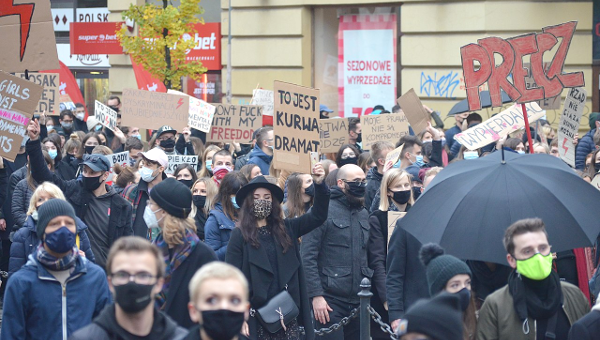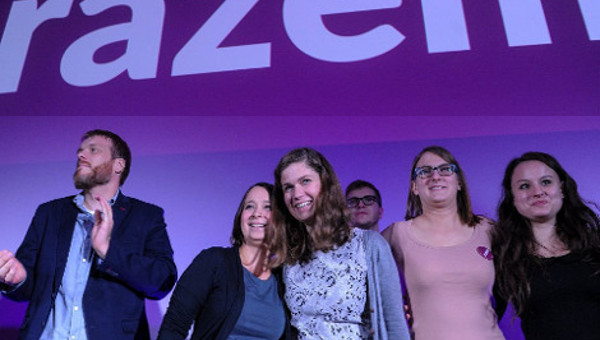“The smell of inaction” is how Dipti Bhatnagar, Friends of the Earth Mozambique’s international program director for climate justice and energy, summed up the atmosphere inside the giant Narodowy Stadium after the first week of the latest round of international climate negotiations, Conference of the Parties, otherwise known as COP 19, taking place November 11-22, 2013, in Warsaw, Poland. Given that this is the 19th consecutive year of annual negotiations and with a meaningful global treaty more distant now than it was almost two decades ago, Bhatnagar’s olfactory deduction seems likely to be highly accurate.

As the pervasive smell of inaction seeped like a suffocating gas throughout the inside of the conference, outside, the choking effects of coal smoke waft from all corners of a country that obtains 90 per cent of its electricity from coal and whose government has pledged to keep it that way until 2060. As if to emphasize the point, just on the other side of the banks of the Vistula River, a stone’s throw from the international climate negotiations, another conference is being held at the Polish Ministry of the Economy. Intent on sending a none-too-subtle message to government negotiators at COP 19, coal industry executives have gathered at the International Coal and Climate Conference, November 18-19, to discuss the future of coal in light of climate change.
If this were a rational system set up to benefit humanity, one might think that, as coal burning releases more carbon than other fossil fuels in addition to small particulates that infiltrate and cause chronic lung damage as well as other toxic chemicals that increase the risk of cancer and cause acid rain – coal industry leaders might be discussing how to shift their investments, to phase out coal and transition to alternative energy production methods that don’t rely on burning such a noxious substance.
“Clean Coal”
In reality, the conference was put on for precisely the opposite reasons. Attendees, with the blessing of the Polish government, were there to argue for the future of “clean coal.” This technology is known as CCS (carbon capture and storage). And although it seeks to trap and bury carbon emissions from coal plants, it doesn’t exist in any meaningful commercial form. Even some supporters harbor increasing doubts that it ever will be made to work on the scale necessary. But, nevertheless, it is being touted as the way to “safely” continue burning coal.
Even the head of the delegation of one of the most conservative and pro-business environmental NGOs at the conference, Tasneem Essop of the World Wildlife Fund, commented, ”For the coal industry to come to Warsaw at a time when we are dealing with these serious issues and to say they have a future and try to pretend they are making a contribution is a bit provocative.” The insanity of burning more coal to “clean it up” was underscored at the protests of climate justice activists outside the opening day of the coal conference on November 18.
Bringing solidarity greetings, sadness and anger from the Filipino people and the rest of the Global South demanding climate justice, Gerry Arances, national coordinator of the Philippines Movement for Climate Justice, spoke at the protest outside the coal conference:
“There is no such thing as clean coal. Coal kills. Friends, colleagues, before Typhoon Haiyan, or what we call Typhoon Yolanda disaster in the Philippines, coal slowly, painfully is killing my brothers and sisters in Mindanao, in the Visayas [Islands], in Lausan, with all the coal mining and coal power plant projects in my country. They are selling ‘clean coal’ in my country – and we say to them, this is a big lie. Because, in so many places, they are destroying our forests; they are destroying our mountains; they are destroying our watersheds.”
A giant pair of inflatable lungs were hoisted into the air by protesters to represent how coal makes the air we breathe a toxic soup of tiny particles that clogs up the lungs and causes respiratory ailments, exacerbates asthma and leads to early death for hundreds of thousands of people around the world.
As an example of the health effects of coal, the conservative American Economic Review published an economics paper in 2011, analyzing the health impacts of coal in the United States. Its conclusion was that the negative results of coal production actually outweigh the economic benefits of burning it in power stations. In other words, if one takes into account the loss of productivity because of illness and the costs of medical treatment for people with impaired respiratory systems from coal emissions, even discounting climate change impacts, coal makes a net negative contribution to economic development.
Against the wishes of many of the environmental NGOs and climate activists at COP 19, not to mention the demonstrators outside the coal conference, Christina Figueres, the UN’s chief climate negotiator, went to address the coal industry. While Figueres told coal leaders they had to change and most coal had to stay in the ground, her seemingly anti-coal message was completely contradicted by her remarks that the industry had “the opportunity to be part of the worldwide climate solution” by adopting different technologies, such as CCS and the construction of high efficiency coal burning plants.
This is exactly what the coal industry lobbying group, the World Coal Association, in conjunction with the Polish economics ministry, argued in their Warsaw Communiqué, published in September 2013, as a pre-emptive strike against the idea that their industry had no future in a warming world. The communiqué argued for more funding and investment for “high efficiency” coal projects and CCS technology to further spread coal burning around the world, in exactly the kind of projects criticized by Arances for the slow death of Filipinos.
The ethics-free entities otherwise known as Western banks have not been shy about continuing to fund coal projects around the world. According to a study released by BankTrack, Banking on Coal, just 20 banks have been responsible for almost three-quarters of the $113-billion given to support coal mining activities around the world between 2005 and mid-2013, representing a 400 per cent increase. The biggest contributor was Citibank, closely followed by heavy investments from Morgan Stanley, Bank of America and the large British banks. Unsurprisingly, given the finances pumped into coal production, there are 1,200 new coal plants under construction around the world.
As the latest data from the UN illustrate, we now know only 20 per cent of the remaining fossil-fuel reserves can be burnt if humanity is to stand any chance of remaining within the critical threshold of 2 degrees Celsius of warming. In spite of that fact, each of these coal plants will have a life span of at least 40 to 50 years, thereby promising the world the continuation of coal burning even as we approach the 22nd century. No doubt the most recalcitrant states, such as the United States, which has consistently argued against a global climate emissions deal, were given confidence in their obstructionism by Figueres herself.
When asked a month before COP 19 whether the new UN data, requiring a strict carbon cap to leave most fossil reserves under the ground, would underpin negotiations, Figueres responded absolutely not. “I don’t think it’s possible. … Politically it would be very difficult. I don’t know who would hold the pen.” In other words, scientific reality should be ignored in favor of political “reality” and the intransigence of powerful states prepared to sacrifice island nations and people in the developing world to the priorities of financial accumulation.
John Gummer, chairman of the British government’s climate advisers and former UK environment minister, who infamously forced his children to eat beef before the TV cameras to reassure Britons of the safety of British beef during the outbreak of Mad Cow Disease, was prompted to remark that “calling coal a clean solution is like characterizing sex trafficking as marriage guidance.”
COP 30 or a COP 40?
Although you wouldn’t know it from the invisibility of progress, the COP 19 talks come in the wake of the enormous, and still unfolding, tragedy of Typhoon Haiyan, the strongest storm in recorded history, with gusts of wind clocked at 235 mph, whipping up waves 16 feet high and burying the Philippines under a tempest of unprecedented ferocity. At the opening of the talks, the Philippines’ top negotiator, Commissioner Naderev Sano, made an emotional plea on behalf of his country for the international community to “stop the madness” and come to its senses, by taking urgent action to prevent further climate change:
“It is the 19th COP, but we might as well stop counting, because my country refuses to accept that a COP30 or a COP40 will be needed to solve climate change. … Now, we find ourselves in a situation where we have to ask ourselves – can we ever attain the ultimate objective of the convention? – which is to prevent dangerous anthropogenic interference with the climate system? By failing to meet the objective of the convention, we may have ratified our own doom.”
Sano is on hunger strike for the duration of the conference, along with dozens of other attendees. They are standing in solidarity with the tens of thousands of desperate Filipinos who are facing hunger, disease and homelessness in many of the most seriously affected areas of the Philippines.
Sano wants to increase the pressure on climate negotiators to broker a meaningful deal. Such an outcome is highly unlikely however, as vested corporate interests and their proposed solutions dominate the climate talks. Like the waves of Haiyan, corporate power and the competing priorities of nation states are drowning out the demands of people in the Global South for urgent and deep cuts to fossil fuel emissions and increased funding for climate adaptation.
Despite the very low bar set in previous rounds of negotiations, there’s a reason that the outcome of COP 19 is likely to be the worst yet: it’s the most business-friendly COP so far, with the smallest participation from government ministers.
The conference walls are plastered with the corporate logos of Arcelor Mittal, the world’s largest steel and mining corporation, along with BMW, Emirates Air, Ikea and Polish fossil fuel giants PGE and Lotos Group. Astonishingly for a conference that is supposed to be about reducing emissions from fossil fuels, it is being sponsored by the very organizations whose business model relies on pumping out more. Such are the dismal hopes for progress. Three in every ten countries party to the talks haven’t bothered to send ministers, ensuring those 60 countries will be unable to authorize any commitment to a climate deal.
At the conference, an entire 130-page glossy brochure is devoted to “Looking to the Future of Carbon Markets,” even though the European Trading System is a shambles and the concept of carbon trading for pollution has been condemned widely by climate justice groups throughout the Global South.
Rather than raising the level of ambition for deeper emissions cuts and increased funding for developing countries to cope with climate change and transition to alternative energies, countries in the North, responsible for the overwhelming majority of historical emissions to date, are instead further lowering the scope of their commitments.
Just prior to the talks, Canada, a country quickly on its way to becoming a rogue petro-state for extreme energy extraction, gave up any remaining pretense over where it stood with regard to doing anything about climate change. In a formal statement from Paul Calandra, parliamentary secretary to Canadian Prime Minister Stephen Harper, Canada “applauded” the Australian government’s commitment to repealing a carbon tax on the 300 largest polluters. The statement was quite explicit in noting that the “Australian prime minister’s decision will be noticed around the world and sends an important message.”
The Japanese government also has dialed back its climate commitments, justifying the decision by referencing the ongoing nuclear catastrophe at Fukushima. The Japanese people have used every opportunity since March 2011 to demonstrate their anger against the irresponsibility of nuclear corporation Tepco and their desire to keep all nuclear plants in Japan closed for good, by generating electricity through alternative means. By twisting their meaning, the Japanese government is using the protests of its citizens to argue it can’t follow through on previous commitments, even as it continues to try to find ways to restart the reactors.
With developing countries arguing for greater financial assistance to deal with the increasing costs of trying to survive extreme weather events and mitigate future climate change, the United States already has signaled its unhappiness with the way in which talks in Warsaw could focus on financial support and “blame and liability.” The Global Climate Fund, which rich countries, with much fanfare, previously had pledged to finance to the tune of $100-billion per year by 2020, so far has seen a dearth of actual money deposited.
“Today the poor are suffering from climate change. But tomorrow the rich countries will be. It starts with us, but it goes to them.”
In response to these announcements, Munjurul Hannan Khan, representing the world’s 47 least affluent countries, made the obvious point that the self-serving short-term outlook of developed countries was illogical and ultimately would prove self-defeating, “They are behaving irrationally and unacceptably. The way they are talking to the most vulnerable countries is not acceptable. Today the poor are suffering from climate change. But tomorrow the rich countries will be. It starts with us, but it goes to them.”
This is a point not lost on people in the North. Much is often made in the media and by U.S. politicians of Americans’ disinterest, if not outright disbelief, in climate change. In contrast, however, proving yet again that ordinary Americans are much more in touch with reality than the U.S. political class that purports to represent them, several recent polls indicate that a full 70 per cent of Americans want something done about climate change. Likewise, in Poland, where the government hides behind the supposed indifference or rejection of action on climate change, there is a similar groundswell of public opinion in favor of greater action.
In data collected by the Polish market research company CEM Market and Public Opinion Research Institute, 80 per cent of Poles believe climate change is a serious problem and 63 per cent want their energy to come from renewable sources. Similarly, a Greenpeace poll found that 73 per cent of Poles want more action to prevent climate change.
The backsliding of the governments of countries such as Canada, Japan and Australia and the refusal of the United States to back an international treaty, combined with almost two decades of failed negotiations, set against a backdrop of escalating climatic dysfunction and extreme weather events such as Typhoon Haiyan, led 750 climate justice activists to board a train from Brussels to Warsaw for demonstrations on November 16. Over the course of the 18-hour train ride, a glimpse was offered of the kind of positive alternative that exists, if people can build the movement for climate justice more widely.
Climate Justice Train
Each carriage was organized by different environmental and left-wing groups, with two stewards appointed to each. While organizers had hoped for 500 passengers, more than 750 rode the climate justice train to Warsaw. Each carriage was adorned with banners, flags and posters proclaiming the politics of different groups; even the toilet doors had polite multilingual handmade signs detailing appropriate and considerate usage. Nutritious food was provided and served from a food car taken over and run by dedicated activists; drinks and food were served throughout by Oxfam and a local organic brewery. All train announcements were made in three languages, and a train carriage was set aside as a “debate car.”
This proved entirely superfluous, because debates and discussions raged the length and breadth of the train, long into the early hours of the morning: about how to build the movement, what position to take on different issues, what could be expected from the climate talks in Warsaw and how the demonstrations might affect them. The hopeful, energetic and tremendously inspiring atmosphere couldn’t have been more different to the pall of futility enveloping the official COP 19 talks at the stadium in Warsaw. The train ambience was multinational and multicultural in the best sense of those terms, comradely and with a vivacious spirit and energy that was infectious as people shared thoughts, food and stories.
A mighty diversity of background, nationalities and types of people were in evidence: from trade unionists to an anarchist medical doctor from Switzerland, a Parisian research chemist on her first demonstration, a contingent of more than 100 young people from COMAC, the youth wing of the Workers Party of Belgium, and many others. As we traveled across Belgium and Germany, we picked up more people at each stop along the way.
The only negative came when exhausted activists were woken at 6:30 AM to the sound of more than 100 Polish police boarding the train with dogs. Because Poland is now part of the European Union, there should be no internal border controls between member countries. But in another sign of the criminalization of dissent and of the right to peaceful protest, the train was kept for almost two hours at the border crossing from Germany into Poland. Schengen, the European border controls, were reinstituted November 8, specifically to antagonize and harass activists traveling to protest COP 19 – surely a legitimate right in a democratic union of countries.
The train arrived late – but in time for the demonstration against the corporate priorities on display at COP 19 and the do-nothing antics of the representatives of the major polluting countries. Train riders poured out from the station in droves, ready to join thousands more activists to march on Narodowy Stadium for climate and social justice.
One of the most popular call-and-response chants on the boisterous Saturday demonstration made clear the internationalism, solidarity and priorities of those involved: “The Philippines, Pakistan, New Orleans: Change the System, Not the Climate.” That’s something worth fighting for. •
Copyright, Truthout.org. Reprinted with permission.





